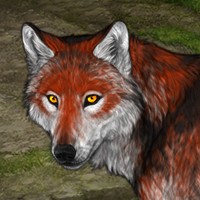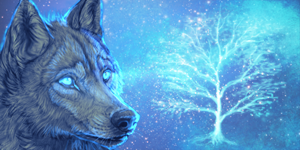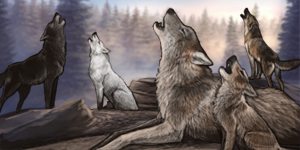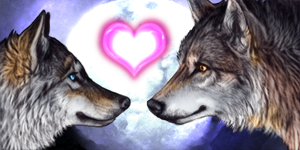Phoenix Tribe
The Phoenix Tribe was founded September 15, 2024. Phoenix wolves live in the Fallen Oak Camp of the deciduous forest. They spend their days hunting and gathering in excess of what they need.
Camp Introduction:
Smell fresh rainfall on cedar wood, chilled by rolling fog. Hear undergrowth crunching beneath your paws and birds chattering out of sight among the branches. Travel deeper into the wilds of the deciduous forest, and there you will find the corpse of a metal beast. Cold, sharp wings glint through the mist, their breadth dwarfing the surrounding trees. Its body is crushed and bent in unnatural shapes. Paints and strange symbols are faded against its white steel, dulled by years in the sun. It's a synthetic god, born of Human hands to cut the skies.
Its body is solemn and silent now.
Its death wrote destruction into the forest's history--trunks tilt, severed and ripped. Wounds from licking flames and gluttonous fires charred the now empty clearing. This graveyard echos its spirits of smoke and flame.
Look closer. You realize this is more than the toppled god's resting place--this is the home of wolves.
Pelts and burrows line the trees, adorned with feathers and trinkets. Wolves busy themselves in their camp, eyeing you as they pass through. These are Phoenix Tribe wolves. Phoenix wolves wear the damage hunting has on their bodies, but boast strong frames and rippling muscle. They primarily hunt elk and bovine, with their most successful hunters clearly aided by their sheer strength. Each wolf earns their keep, putting in tremendous hours hunting and gathering trophies.
West of the Metal Beast is a birch tree split by lightning. Beside it is a cave mouth, carved with what you've identified as Clawmark script. You can smell the tantalizing scent of prey wafting from it, followed by the sharp, earthy scent of freshly gathered herbs. Two well-kept nests rest by the entrance, guarding whatever is inside. You peek inside to see a grey wolf bustling about, too occupied to notice your presence. Pulp coats his paws and mouth from grinding herbs into salves.
In the heart of camp is a crater. You won't spot it from where you are; instead, look for the massive rock coated in green undergrowth. In its shadow, mothers and pupsitters wolves play with the pups, bones and chews littered on the earth surrounding them.
A gruff voice calls you from behind, asking you to state your business. You turn and lock gazes with the golden eyes of a massive wolf. His striking red dilution glimmers in the misty light, like a cape of blood against his white coat. His pelt is unkept after returning from an exploration, dirt caked against the natural black and grey dilution of his fur. It does nothing to lessen your intimidation, the thick muscle against his frame enough of a threat to make your mouth dry. The wolf's gaze is steady, seemingly confident in handling whatever intentions you may have.
His name is Mercy, and he is the tribe's founder. He speaks with a hint of an unfamiliar accent, making you wonder where he came from. Clearly he's been here long enough to become something of the tribe's leader, although Mercy would insist he's simply head of the scouts.
Welcome, traveler, to the Phoenix Tribe. What brings you here?
Geography (WIP)
So far we had a very tight knit camp, but maybe we should spread out a bit? Now that we're a lot bigger of a tribe we can't really fit in the base camp... not sure what to do about this. We could always become somewhat distanter colonies, although we could also expand the camp and make it something like a town.
Tribe Culture and Mythology (WIP)
The current keepers of tribe mythology are Raven and Cedar.
Time is counted by Sun cycles, which are seen as more consistent than the ever-changing Moons. Yearly cycles are split into two seasons: the Sun Sublunary (Spring and Summer) where the earth spends more time under the Sun's influence, and the Moon Sublunary (Fall and Winter) where the earth spends more time influenced by the Moons. The Sun and Moon are seen to represent temporal life and death, respectively.
Sublunary suns are seen as rebirth and growth, where extended time under the sun infuses new energy into the earth. This is the time wolves try to work on projects, develop relationships with new wolves, cultivate plants, and is a popular time to rear pups. Wolves born in Sun sublunaries absorb the sun's energy and embody growth.
Sublunary Moons are seen as a time for rest, death, and change. Moons are desirable times to hunt and enjoy fruits of the sun's labor, allowing the earth to use its grown resources. The Moons change each time they pass through the stars, and so do Phoenix Tribe wolves. They see the Moon Sublunary as a time to reflect, forms new habits, and use resources gathered under the Sun.
Gender in the tribe is based on age and familial relation, not sex. I refer to them with an appropriate pronoun in English, but you'll see I try to forego terms like "brother" and "sister" when possible, since those don't exist in their language. The age groups with separate pronouns are as follows:
Pups, from 0 to 6 months.
Adolescents, from 6 months to a year.
Yearlings, from 1 to 2 years.
Adults, from 2 to 5 years.
Elders, from 6 to 8 years.
The older the wolf, the more generally respected they are and the more privileges they can exercise in the tribe. While old wolves can be wise, the logic in this tribe is that you earn the fruits of your labor with age, and should reap them after hard service. It leads to somewhat harsh conditions for yearlings, adolescents, and even adults while elders and pups are most protected.
The concept of sex assignment still exists and influences wolves' lives, albeit less so than in human society. It has a near inseparable notion of sex and reproduction from gender. "Mother" and "Father" exist and are tied up heavily as biological parents, with little wiggle room, although the third parental figure as "Pupsitters" is nongendered and often seen as an equal role in the family structure.
Studs are nearly synonymous with masculinity, generating most of the stereotypes and power structures for male identity. The role is heavily associated with biological sex, heterosexuality, blood lineage, physical attractiveness, and desirable anatomy.
Same-sex pairbonds are seen as natural and equal to opposite-sex pairs, although they face discrimination in parental roles. They are treated more like pupsitters than mothers or fathers to any of their litters, which suppresses and discourages same-sex attracted wolves who want to be parents. Male same-sex pairbonds can be hypersexualized, treated as something of a "two stud" problem. Female same-sex pairbonds are stereotyped as nonsexual, and sexual intimacy can be unsightly, morally wrong, or taboo.
Wolves that are seen as especially well endowed with genetics, looks, or any other desirable trait, often face discouragement and scorn when they are attracted to the same sex.
Transgender wolves face no discrimination with livelihood, appearance, or opportunity, and are never misgendered due to the language's construction. They instead face a backlash expressing sexuality and starting a family.
Thanks to sex changers, wolves can easily change their biological sex if they wish. Sadly, they often deal with inappropriate, invasive comments and questions from packmates about it. Their pairbonds may be socially treated as their assigned sex at birth and not their actual sex.
Transgender wolves who choose not to change their sex often face confusion and disrespect. Transfem wolves face strong stud discrimination, especially if they're physically attractive or have good genes.
Thankfully, that's where the discrimination ends, and transgender wolves still reap the same benefits of age as their cisgender packmates.
Future Projects:
* 10x marks t6: wip dream boy dont worry that hes ugly rn
* leaderboard stud (set when i was a new player, now i realize i dont have the MONEYYYY lol)
* carrier projects.
* bloodhound mel (happening rn) and bloodhound meg
Camp Introduction:
Smell fresh rainfall on cedar wood, chilled by rolling fog. Hear undergrowth crunching beneath your paws and birds chattering out of sight among the branches. Travel deeper into the wilds of the deciduous forest, and there you will find the corpse of a metal beast. Cold, sharp wings glint through the mist, their breadth dwarfing the surrounding trees. Its body is crushed and bent in unnatural shapes. Paints and strange symbols are faded against its white steel, dulled by years in the sun. It's a synthetic god, born of Human hands to cut the skies.
Its body is solemn and silent now.
Its death wrote destruction into the forest's history--trunks tilt, severed and ripped. Wounds from licking flames and gluttonous fires charred the now empty clearing. This graveyard echos its spirits of smoke and flame.
Look closer. You realize this is more than the toppled god's resting place--this is the home of wolves.
Pelts and burrows line the trees, adorned with feathers and trinkets. Wolves busy themselves in their camp, eyeing you as they pass through. These are Phoenix Tribe wolves. Phoenix wolves wear the damage hunting has on their bodies, but boast strong frames and rippling muscle. They primarily hunt elk and bovine, with their most successful hunters clearly aided by their sheer strength. Each wolf earns their keep, putting in tremendous hours hunting and gathering trophies.
West of the Metal Beast is a birch tree split by lightning. Beside it is a cave mouth, carved with what you've identified as Clawmark script. You can smell the tantalizing scent of prey wafting from it, followed by the sharp, earthy scent of freshly gathered herbs. Two well-kept nests rest by the entrance, guarding whatever is inside. You peek inside to see a grey wolf bustling about, too occupied to notice your presence. Pulp coats his paws and mouth from grinding herbs into salves.
In the heart of camp is a crater. You won't spot it from where you are; instead, look for the massive rock coated in green undergrowth. In its shadow, mothers and pupsitters wolves play with the pups, bones and chews littered on the earth surrounding them.
A gruff voice calls you from behind, asking you to state your business. You turn and lock gazes with the golden eyes of a massive wolf. His striking red dilution glimmers in the misty light, like a cape of blood against his white coat. His pelt is unkept after returning from an exploration, dirt caked against the natural black and grey dilution of his fur. It does nothing to lessen your intimidation, the thick muscle against his frame enough of a threat to make your mouth dry. The wolf's gaze is steady, seemingly confident in handling whatever intentions you may have.
His name is Mercy, and he is the tribe's founder. He speaks with a hint of an unfamiliar accent, making you wonder where he came from. Clearly he's been here long enough to become something of the tribe's leader, although Mercy would insist he's simply head of the scouts.
Welcome, traveler, to the Phoenix Tribe. What brings you here?
Geography (WIP)
So far we had a very tight knit camp, but maybe we should spread out a bit? Now that we're a lot bigger of a tribe we can't really fit in the base camp... not sure what to do about this. We could always become somewhat distanter colonies, although we could also expand the camp and make it something like a town.
Tribe Culture and Mythology (WIP)
The current keepers of tribe mythology are Raven and Cedar.
Time is counted by Sun cycles, which are seen as more consistent than the ever-changing Moons. Yearly cycles are split into two seasons: the Sun Sublunary (Spring and Summer) where the earth spends more time under the Sun's influence, and the Moon Sublunary (Fall and Winter) where the earth spends more time influenced by the Moons. The Sun and Moon are seen to represent temporal life and death, respectively.
Sublunary suns are seen as rebirth and growth, where extended time under the sun infuses new energy into the earth. This is the time wolves try to work on projects, develop relationships with new wolves, cultivate plants, and is a popular time to rear pups. Wolves born in Sun sublunaries absorb the sun's energy and embody growth.
Sublunary Moons are seen as a time for rest, death, and change. Moons are desirable times to hunt and enjoy fruits of the sun's labor, allowing the earth to use its grown resources. The Moons change each time they pass through the stars, and so do Phoenix Tribe wolves. They see the Moon Sublunary as a time to reflect, forms new habits, and use resources gathered under the Sun.
Gender in the tribe is based on age and familial relation, not sex. I refer to them with an appropriate pronoun in English, but you'll see I try to forego terms like "brother" and "sister" when possible, since those don't exist in their language. The age groups with separate pronouns are as follows:
Pups, from 0 to 6 months.
Adolescents, from 6 months to a year.
Yearlings, from 1 to 2 years.
Adults, from 2 to 5 years.
Elders, from 6 to 8 years.
The older the wolf, the more generally respected they are and the more privileges they can exercise in the tribe. While old wolves can be wise, the logic in this tribe is that you earn the fruits of your labor with age, and should reap them after hard service. It leads to somewhat harsh conditions for yearlings, adolescents, and even adults while elders and pups are most protected.
The concept of sex assignment still exists and influences wolves' lives, albeit less so than in human society. It has a near inseparable notion of sex and reproduction from gender. "Mother" and "Father" exist and are tied up heavily as biological parents, with little wiggle room, although the third parental figure as "Pupsitters" is nongendered and often seen as an equal role in the family structure.
Studs are nearly synonymous with masculinity, generating most of the stereotypes and power structures for male identity. The role is heavily associated with biological sex, heterosexuality, blood lineage, physical attractiveness, and desirable anatomy.
Same-sex pairbonds are seen as natural and equal to opposite-sex pairs, although they face discrimination in parental roles. They are treated more like pupsitters than mothers or fathers to any of their litters, which suppresses and discourages same-sex attracted wolves who want to be parents. Male same-sex pairbonds can be hypersexualized, treated as something of a "two stud" problem. Female same-sex pairbonds are stereotyped as nonsexual, and sexual intimacy can be unsightly, morally wrong, or taboo.
Wolves that are seen as especially well endowed with genetics, looks, or any other desirable trait, often face discouragement and scorn when they are attracted to the same sex.
Transgender wolves face no discrimination with livelihood, appearance, or opportunity, and are never misgendered due to the language's construction. They instead face a backlash expressing sexuality and starting a family.
Thanks to sex changers, wolves can easily change their biological sex if they wish. Sadly, they often deal with inappropriate, invasive comments and questions from packmates about it. Their pairbonds may be socially treated as their assigned sex at birth and not their actual sex.
Transgender wolves who choose not to change their sex often face confusion and disrespect. Transfem wolves face strong stud discrimination, especially if they're physically attractive or have good genes.
Thankfully, that's where the discrimination ends, and transgender wolves still reap the same benefits of age as their cisgender packmates.
Future Projects:
* 10x marks t6: wip dream boy dont worry that hes ugly rn
* leaderboard stud (set when i was a new player, now i realize i dont have the MONEYYYY lol)
* carrier projects.
* bloodhound mel (happening rn) and bloodhound meg
| Pack Leader Mercy | ||||||||||||
|---|---|---|---|---|---|---|---|---|---|---|---|---|
|




